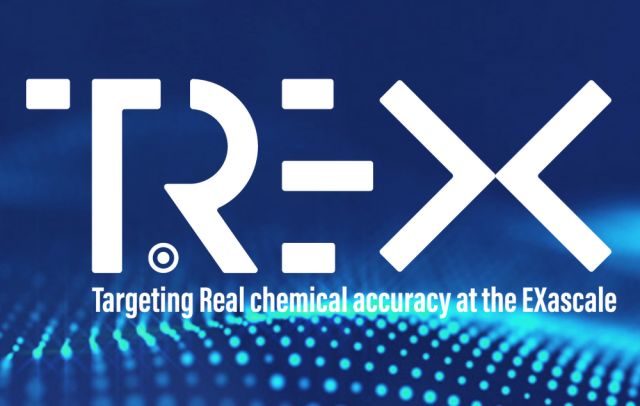TREX: the European Center of Excellence in exascale computing
- /
- News
- /
- TREX: the European Center...

On October 1st, the European Center of Excellence in exascale computing “TREX – Targeting Real chemical accuracy at the EXascale”, has officially started its activities. TREX Center of Excellence is a consortium of 12 partners, funded under the Horizon 2020 program. Cineca is part of this consortium and will contribute with scientific expertise and HPC facilities.
In recent years, the European Commission has seriously committed to the challenge, which also see US and China competing, to build one of the first computers able to reach the computational power of 1 Exaflop (i.e. 1’000’000’000’000’000’000 or 1x1018 operations per second!), with the establishment of the EuroHPC initiative. The exascale era we are entering offers an unprecedented, large amount of computational resources to the scientific and industrial community. This huge computational power will permit to perform simulations which are not affordable at the moment, challenge the limits of scalability of the applications but also enable ensemble simulations in a so-called high-throughput approach (for example, screening a huge number of drugs to quickly find the most effective ones). Naturally, such investments pose the question of how to optimally exploit these precious computational resources. It is generally acclaimed that one of the keys in the future of computational sciences is enabling massive parallelism. Parallel computing is simply the capacity of computers to execute calculations in parallel and it goes without saying that optimizing simultaneous operations leads to streamlined processes with a net saving in the needed time of execution. In fact, for problems requiring exascale computing performance, the scientific codes have to be significantly modified to exploit the parallel scaling. Moreover, the supercomputing architectures are moving towards heterogenous models, where their complexity poses many challenges to the developers and users’ community. In order to face these challenges, a huge and joint effort of domain scientists and computational experts is required. This rationale pushed the European Union to fund targeted Center of Excellences, each supporting a specific community. The last call awarded TREX as Center of Excellence for the community of quantum chemistry.
TREX federates European scientists, High Performance Computing (HPC) stakeholders, and SMEs to develop and apply high-performance software solutions for quantum mechanical simulations in the framework of stochastic quantum Monte Carlo methods. In quantum chemistry and materials science, it is really hard for most methods to achieve exascale scaling: a large amount of electronic structure applications is still struggling to get the most out of the computational power of current software, and a lot of effort is actually put in moving towards a class of problems able to take advantage of new machines and infrastructures, namely the ones in the exascale era. On the other hand, quantum Monte Carlo approaches are intrinsically parallel and one can state with no hesitation that they are among the few methods in the field of quantum simulations that can fully exploit the massive parallelism of the upcoming exascale architectures. The marriage of these advanced methods with exascale will enable simulations at the nanoscale of unprecedented accuracy, targeting a fully consistent description of the quantum mechanical electron problem for very large systems.
To achieve this goal, TREX’s main focus will be the development of a user-friendly and open-source software suite in the domain of stochastic quantum chemistry simulations, which integrates TREX community codes within an interoperable, high-performance platform. This will permit to greatly enhance the tools available to the scientific community for the design of new materials and the understanding of the fundamental properties of matter. In parallel, TREX will work on show-cases to leverage this methodology for commercial applications as well as develop and implement software components and services that make it easier for commercial operators and user communities to use HPC resources for these applications.
Consortium
The TREX consortium is composed by universities, research institutions, and SMEs from seven different European countries, namely, University of Twente (NL), Centre National de la Recherche Scientifique (Toulouse and Paris, FR), Scuola Internazionale Superiore di Studi Avanzati (Trieste, IT), CINECA (Bologna, IT), Jülich-Supercomputing Centre (DE), Max Planck Institute for Solid State Research in Stuttgart (DE), University of Versailles Saint Quentin-en-Yvelines (FR), Megware (DE), Slovak University of Technology in Bratislava (SK), University of Vienna (AU), Lotz University of Technology (PL), and TRUST-IT (IT).
The scientific core of the consortium is closely linked to two leading European HPC Centres, that is CINECA (IT) and Jülich-Supercomputing Centre (DE), and to Megware, an SME in the field of integration of HPC solutions. Finally, the partner TRUST-IT is an SME specialized in and responsible for the communication, stakeholder engagement, and outreach activities of TREX.
For more information: https://trex-coe.eu/